An Overview: Digital and Social Media Marketing in Consumer Behavior
VerifiedAdded on 2022/09/08
|16
|5804
|22
Report
AI Summary
This article, originally submitted to Current Opinion in Psychology, provides a comprehensive review of recent research on consumer behavior within digital and social media marketing contexts. It identifies five key themes: consumer digital culture, responses to digital advertising, the effects of digital environments on consumer behavior, mobile environments, and online word of mouth (WOM). The author, Andrew T. Stephen, analyzes the impact of these themes on how consumers experience, influence, and are influenced by digital environments. The review covers articles published between January 2013 and September 2015 in leading consumer research journals, highlighting the increasing importance of digital marketing. The article discusses the evolution of consumer behavior in the digital age, touching upon the influence of digital advertising, the impact of mobile devices, and the significance of online WOM and reviews. The author emphasizes the need for continued research in this rapidly changing field, providing a valuable overview for those interested in understanding the dynamics of consumer behavior in the digital landscape.
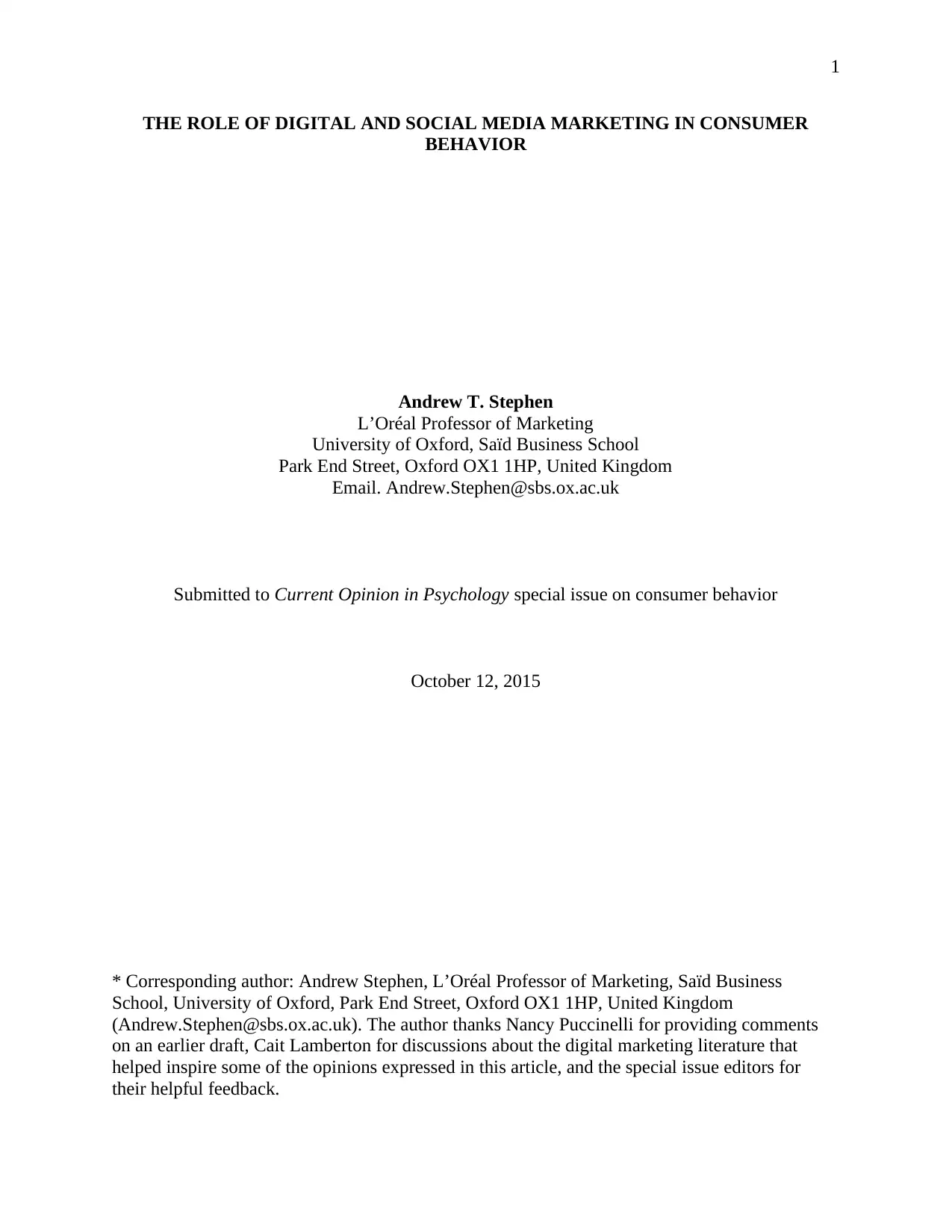
1
THE ROLE OF DIGITAL AND SOCIAL MEDIA MARKETING IN CONSUMER
BEHAVIOR
Andrew T. Stephen
L’Oréal Professor of Marketing
University of Oxford, Saïd Business School
Park End Street, Oxford OX1 1HP, United Kingdom
Email. Andrew.Stephen@sbs.ox.ac.uk
Submitted to Current Opinion in Psychology special issue on consumer behavior
October 12, 2015
* Corresponding author: Andrew Stephen, L’Oréal Professor of Marketing, Saïd Business
School, University of Oxford, Park End Street, Oxford OX1 1HP, United Kingdom
(Andrew.Stephen@sbs.ox.ac.uk). The author thanks Nancy Puccinelli for providing comments
on an earlier draft, Cait Lamberton for discussions about the digital marketing literature that
helped inspire some of the opinions expressed in this article, and the special issue editors for
their helpful feedback.
THE ROLE OF DIGITAL AND SOCIAL MEDIA MARKETING IN CONSUMER
BEHAVIOR
Andrew T. Stephen
L’Oréal Professor of Marketing
University of Oxford, Saïd Business School
Park End Street, Oxford OX1 1HP, United Kingdom
Email. Andrew.Stephen@sbs.ox.ac.uk
Submitted to Current Opinion in Psychology special issue on consumer behavior
October 12, 2015
* Corresponding author: Andrew Stephen, L’Oréal Professor of Marketing, Saïd Business
School, University of Oxford, Park End Street, Oxford OX1 1HP, United Kingdom
(Andrew.Stephen@sbs.ox.ac.uk). The author thanks Nancy Puccinelli for providing comments
on an earlier draft, Cait Lamberton for discussions about the digital marketing literature that
helped inspire some of the opinions expressed in this article, and the special issue editors for
their helpful feedback.
Paraphrase This Document
Need a fresh take? Get an instant paraphrase of this document with our AI Paraphraser
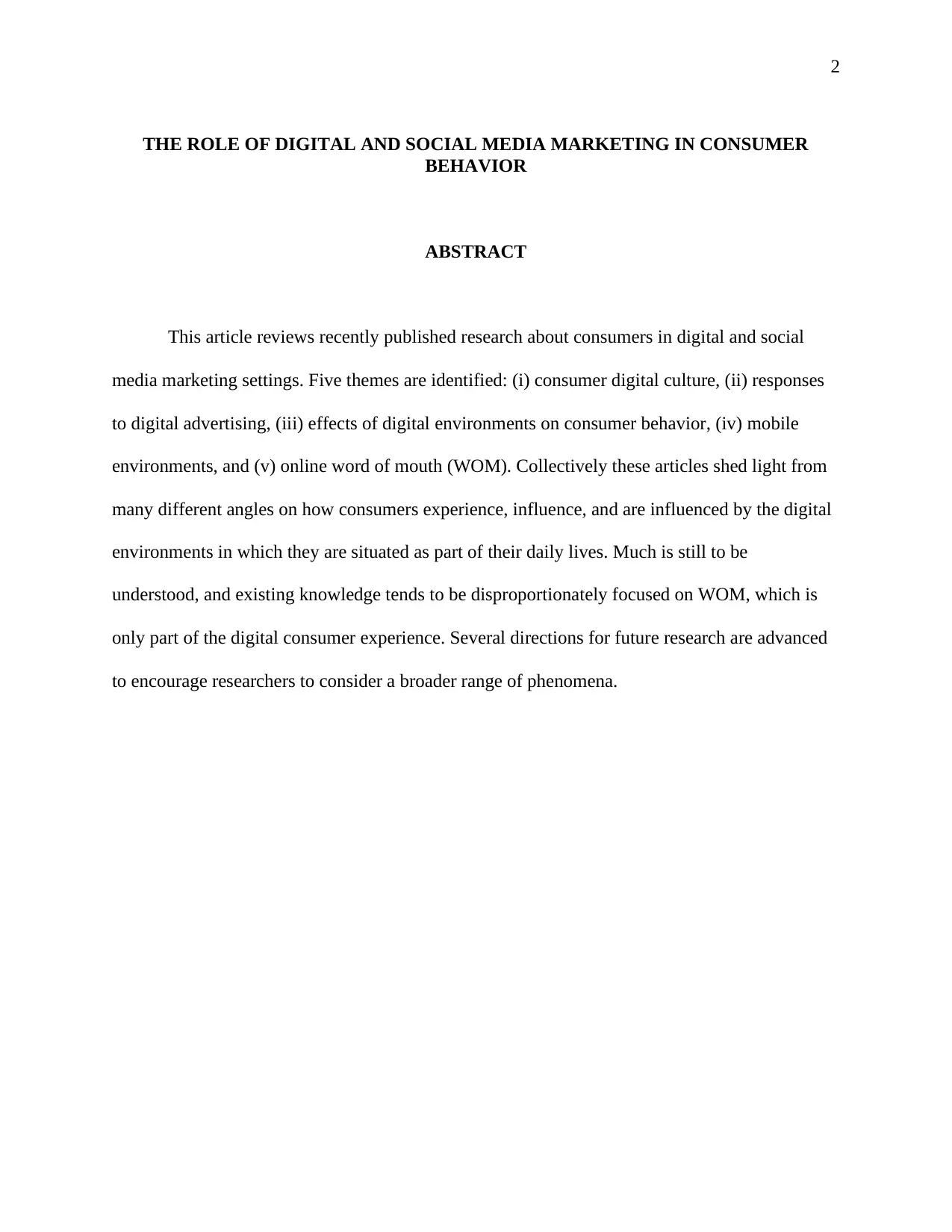
2
THE ROLE OF DIGITAL AND SOCIAL MEDIA MARKETING IN CONSUMER
BEHAVIOR
ABSTRACT
This article reviews recently published research about consumers in digital and social
media marketing settings. Five themes are identified: (i) consumer digital culture, (ii) responses
to digital advertising, (iii) effects of digital environments on consumer behavior, (iv) mobile
environments, and (v) online word of mouth (WOM). Collectively these articles shed light from
many different angles on how consumers experience, influence, and are influenced by the digital
environments in which they are situated as part of their daily lives. Much is still to be
understood, and existing knowledge tends to be disproportionately focused on WOM, which is
only part of the digital consumer experience. Several directions for future research are advanced
to encourage researchers to consider a broader range of phenomena.
THE ROLE OF DIGITAL AND SOCIAL MEDIA MARKETING IN CONSUMER
BEHAVIOR
ABSTRACT
This article reviews recently published research about consumers in digital and social
media marketing settings. Five themes are identified: (i) consumer digital culture, (ii) responses
to digital advertising, (iii) effects of digital environments on consumer behavior, (iv) mobile
environments, and (v) online word of mouth (WOM). Collectively these articles shed light from
many different angles on how consumers experience, influence, and are influenced by the digital
environments in which they are situated as part of their daily lives. Much is still to be
understood, and existing knowledge tends to be disproportionately focused on WOM, which is
only part of the digital consumer experience. Several directions for future research are advanced
to encourage researchers to consider a broader range of phenomena.
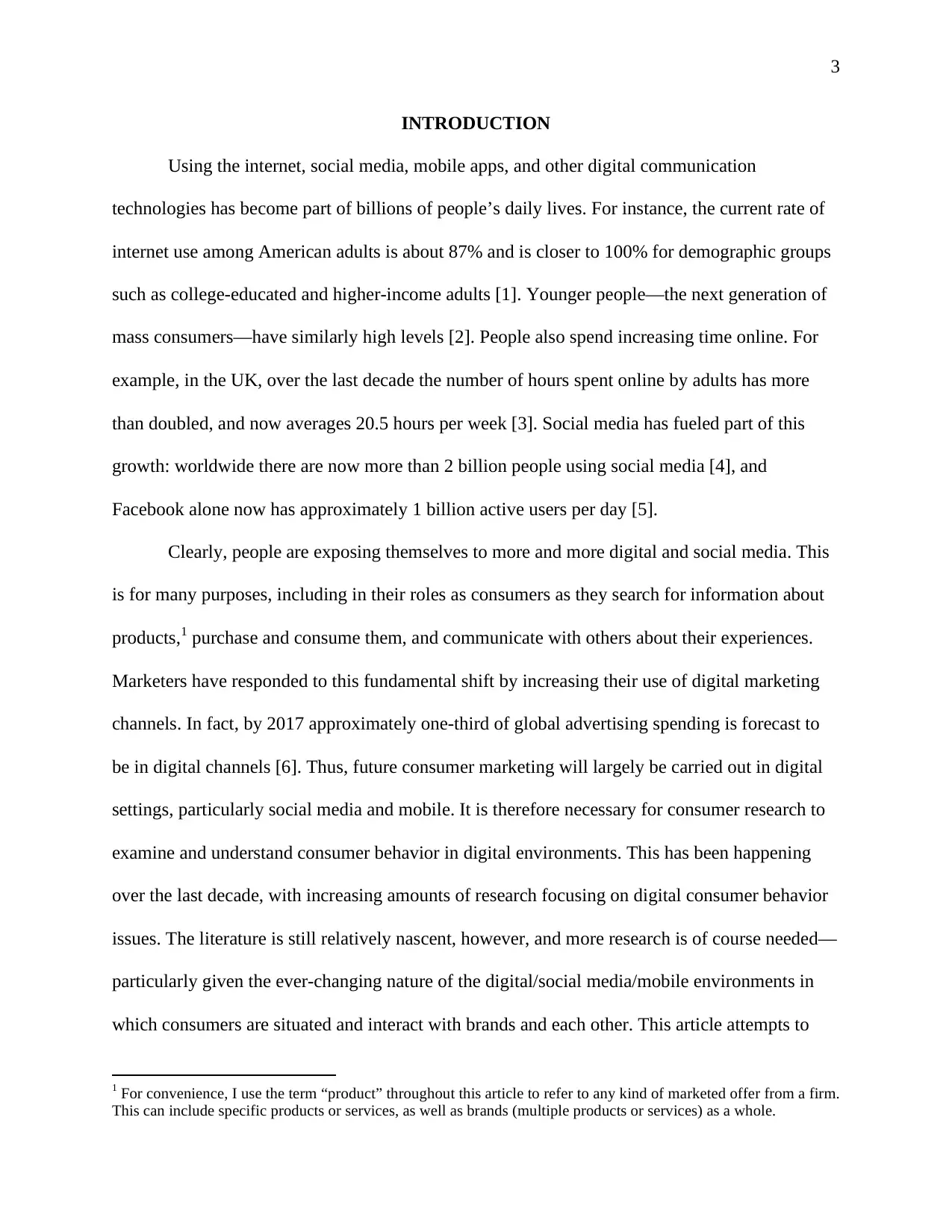
3
INTRODUCTION
Using the internet, social media, mobile apps, and other digital communication
technologies has become part of billions of people’s daily lives. For instance, the current rate of
internet use among American adults is about 87% and is closer to 100% for demographic groups
such as college-educated and higher-income adults [1]. Younger people—the next generation of
mass consumers—have similarly high levels [2]. People also spend increasing time online. For
example, in the UK, over the last decade the number of hours spent online by adults has more
than doubled, and now averages 20.5 hours per week [3]. Social media has fueled part of this
growth: worldwide there are now more than 2 billion people using social media [4], and
Facebook alone now has approximately 1 billion active users per day [5].
Clearly, people are exposing themselves to more and more digital and social media. This
is for many purposes, including in their roles as consumers as they search for information about
products,1 purchase and consume them, and communicate with others about their experiences.
Marketers have responded to this fundamental shift by increasing their use of digital marketing
channels. In fact, by 2017 approximately one-third of global advertising spending is forecast to
be in digital channels [6]. Thus, future consumer marketing will largely be carried out in digital
settings, particularly social media and mobile. It is therefore necessary for consumer research to
examine and understand consumer behavior in digital environments. This has been happening
over the last decade, with increasing amounts of research focusing on digital consumer behavior
issues. The literature is still relatively nascent, however, and more research is of course needed—
particularly given the ever-changing nature of the digital/social media/mobile environments in
which consumers are situated and interact with brands and each other. This article attempts to
1 For convenience, I use the term “product” throughout this article to refer to any kind of marketed offer from a firm.
This can include specific products or services, as well as brands (multiple products or services) as a whole.
INTRODUCTION
Using the internet, social media, mobile apps, and other digital communication
technologies has become part of billions of people’s daily lives. For instance, the current rate of
internet use among American adults is about 87% and is closer to 100% for demographic groups
such as college-educated and higher-income adults [1]. Younger people—the next generation of
mass consumers—have similarly high levels [2]. People also spend increasing time online. For
example, in the UK, over the last decade the number of hours spent online by adults has more
than doubled, and now averages 20.5 hours per week [3]. Social media has fueled part of this
growth: worldwide there are now more than 2 billion people using social media [4], and
Facebook alone now has approximately 1 billion active users per day [5].
Clearly, people are exposing themselves to more and more digital and social media. This
is for many purposes, including in their roles as consumers as they search for information about
products,1 purchase and consume them, and communicate with others about their experiences.
Marketers have responded to this fundamental shift by increasing their use of digital marketing
channels. In fact, by 2017 approximately one-third of global advertising spending is forecast to
be in digital channels [6]. Thus, future consumer marketing will largely be carried out in digital
settings, particularly social media and mobile. It is therefore necessary for consumer research to
examine and understand consumer behavior in digital environments. This has been happening
over the last decade, with increasing amounts of research focusing on digital consumer behavior
issues. The literature is still relatively nascent, however, and more research is of course needed—
particularly given the ever-changing nature of the digital/social media/mobile environments in
which consumers are situated and interact with brands and each other. This article attempts to
1 For convenience, I use the term “product” throughout this article to refer to any kind of marketed offer from a firm.
This can include specific products or services, as well as brands (multiple products or services) as a whole.
⊘ This is a preview!⊘
Do you want full access?
Subscribe today to unlock all pages.

Trusted by 1+ million students worldwide
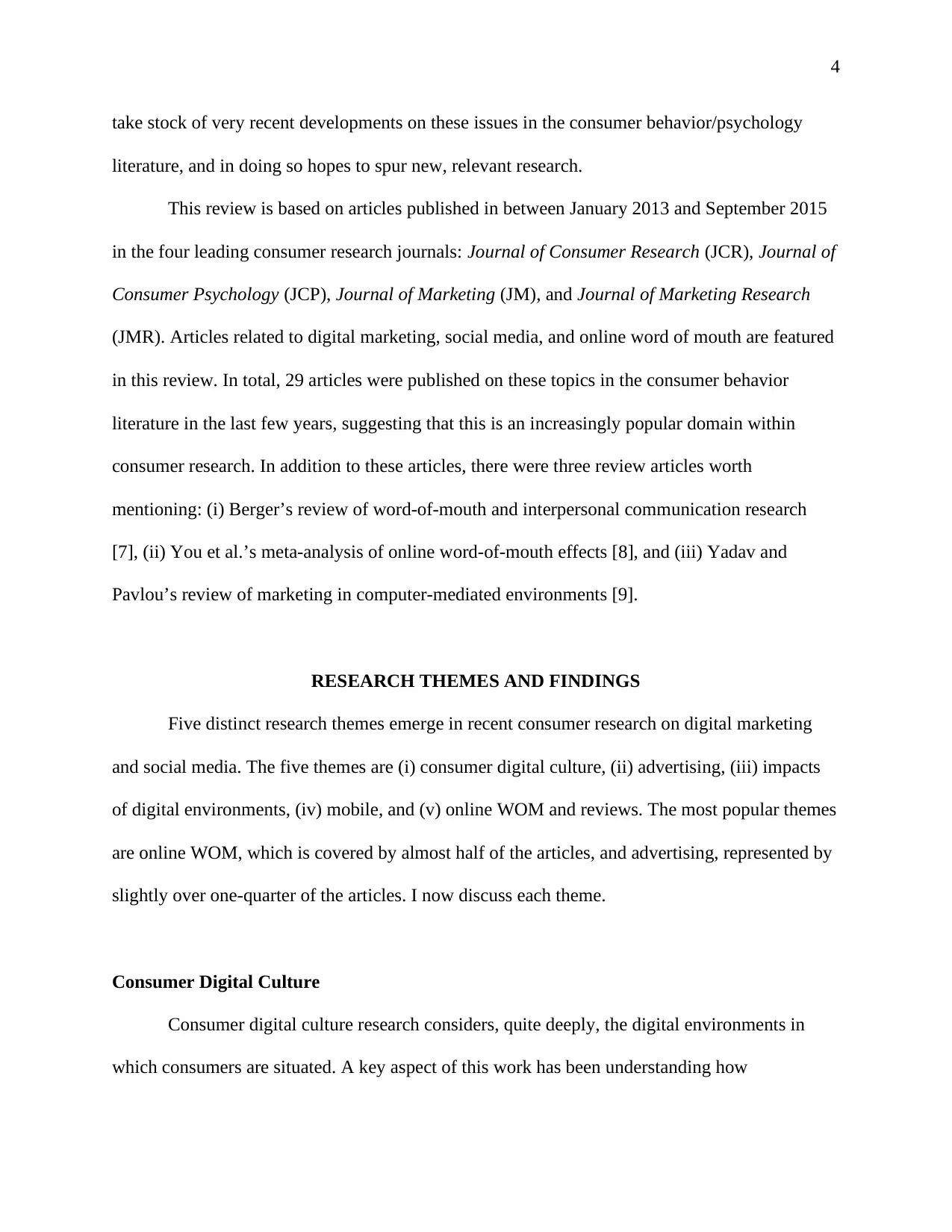
4
take stock of very recent developments on these issues in the consumer behavior/psychology
literature, and in doing so hopes to spur new, relevant research.
This review is based on articles published in between January 2013 and September 2015
in the four leading consumer research journals: Journal of Consumer Research (JCR), Journal of
Consumer Psychology (JCP), Journal of Marketing (JM), and Journal of Marketing Research
(JMR). Articles related to digital marketing, social media, and online word of mouth are featured
in this review. In total, 29 articles were published on these topics in the consumer behavior
literature in the last few years, suggesting that this is an increasingly popular domain within
consumer research. In addition to these articles, there were three review articles worth
mentioning: (i) Berger’s review of word-of-mouth and interpersonal communication research
[7], (ii) You et al.’s meta-analysis of online word-of-mouth effects [8], and (iii) Yadav and
Pavlou’s review of marketing in computer-mediated environments [9].
RESEARCH THEMES AND FINDINGS
Five distinct research themes emerge in recent consumer research on digital marketing
and social media. The five themes are (i) consumer digital culture, (ii) advertising, (iii) impacts
of digital environments, (iv) mobile, and (v) online WOM and reviews. The most popular themes
are online WOM, which is covered by almost half of the articles, and advertising, represented by
slightly over one-quarter of the articles. I now discuss each theme.
Consumer Digital Culture
Consumer digital culture research considers, quite deeply, the digital environments in
which consumers are situated. A key aspect of this work has been understanding how
take stock of very recent developments on these issues in the consumer behavior/psychology
literature, and in doing so hopes to spur new, relevant research.
This review is based on articles published in between January 2013 and September 2015
in the four leading consumer research journals: Journal of Consumer Research (JCR), Journal of
Consumer Psychology (JCP), Journal of Marketing (JM), and Journal of Marketing Research
(JMR). Articles related to digital marketing, social media, and online word of mouth are featured
in this review. In total, 29 articles were published on these topics in the consumer behavior
literature in the last few years, suggesting that this is an increasingly popular domain within
consumer research. In addition to these articles, there were three review articles worth
mentioning: (i) Berger’s review of word-of-mouth and interpersonal communication research
[7], (ii) You et al.’s meta-analysis of online word-of-mouth effects [8], and (iii) Yadav and
Pavlou’s review of marketing in computer-mediated environments [9].
RESEARCH THEMES AND FINDINGS
Five distinct research themes emerge in recent consumer research on digital marketing
and social media. The five themes are (i) consumer digital culture, (ii) advertising, (iii) impacts
of digital environments, (iv) mobile, and (v) online WOM and reviews. The most popular themes
are online WOM, which is covered by almost half of the articles, and advertising, represented by
slightly over one-quarter of the articles. I now discuss each theme.
Consumer Digital Culture
Consumer digital culture research considers, quite deeply, the digital environments in
which consumers are situated. A key aspect of this work has been understanding how
Paraphrase This Document
Need a fresh take? Get an instant paraphrase of this document with our AI Paraphraser
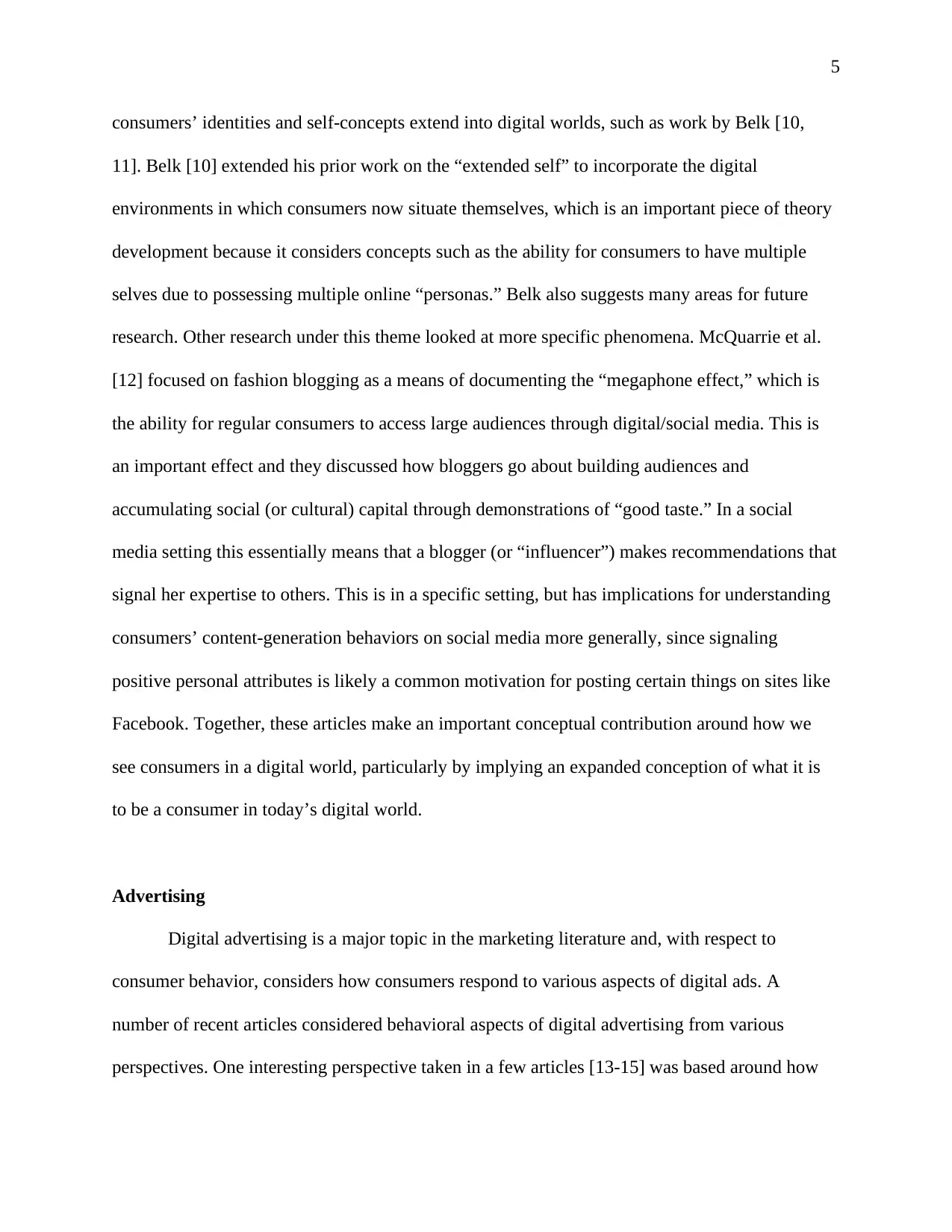
5
consumers’ identities and self-concepts extend into digital worlds, such as work by Belk [10,
11]. Belk [10] extended his prior work on the “extended self” to incorporate the digital
environments in which consumers now situate themselves, which is an important piece of theory
development because it considers concepts such as the ability for consumers to have multiple
selves due to possessing multiple online “personas.” Belk also suggests many areas for future
research. Other research under this theme looked at more specific phenomena. McQuarrie et al.
[12] focused on fashion blogging as a means of documenting the “megaphone effect,” which is
the ability for regular consumers to access large audiences through digital/social media. This is
an important effect and they discussed how bloggers go about building audiences and
accumulating social (or cultural) capital through demonstrations of “good taste.” In a social
media setting this essentially means that a blogger (or “influencer”) makes recommendations that
signal her expertise to others. This is in a specific setting, but has implications for understanding
consumers’ content-generation behaviors on social media more generally, since signaling
positive personal attributes is likely a common motivation for posting certain things on sites like
Facebook. Together, these articles make an important conceptual contribution around how we
see consumers in a digital world, particularly by implying an expanded conception of what it is
to be a consumer in today’s digital world.
Advertising
Digital advertising is a major topic in the marketing literature and, with respect to
consumer behavior, considers how consumers respond to various aspects of digital ads. A
number of recent articles considered behavioral aspects of digital advertising from various
perspectives. One interesting perspective taken in a few articles [13-15] was based around how
consumers’ identities and self-concepts extend into digital worlds, such as work by Belk [10,
11]. Belk [10] extended his prior work on the “extended self” to incorporate the digital
environments in which consumers now situate themselves, which is an important piece of theory
development because it considers concepts such as the ability for consumers to have multiple
selves due to possessing multiple online “personas.” Belk also suggests many areas for future
research. Other research under this theme looked at more specific phenomena. McQuarrie et al.
[12] focused on fashion blogging as a means of documenting the “megaphone effect,” which is
the ability for regular consumers to access large audiences through digital/social media. This is
an important effect and they discussed how bloggers go about building audiences and
accumulating social (or cultural) capital through demonstrations of “good taste.” In a social
media setting this essentially means that a blogger (or “influencer”) makes recommendations that
signal her expertise to others. This is in a specific setting, but has implications for understanding
consumers’ content-generation behaviors on social media more generally, since signaling
positive personal attributes is likely a common motivation for posting certain things on sites like
Facebook. Together, these articles make an important conceptual contribution around how we
see consumers in a digital world, particularly by implying an expanded conception of what it is
to be a consumer in today’s digital world.
Advertising
Digital advertising is a major topic in the marketing literature and, with respect to
consumer behavior, considers how consumers respond to various aspects of digital ads. A
number of recent articles considered behavioral aspects of digital advertising from various
perspectives. One interesting perspective taken in a few articles [13-15] was based around how
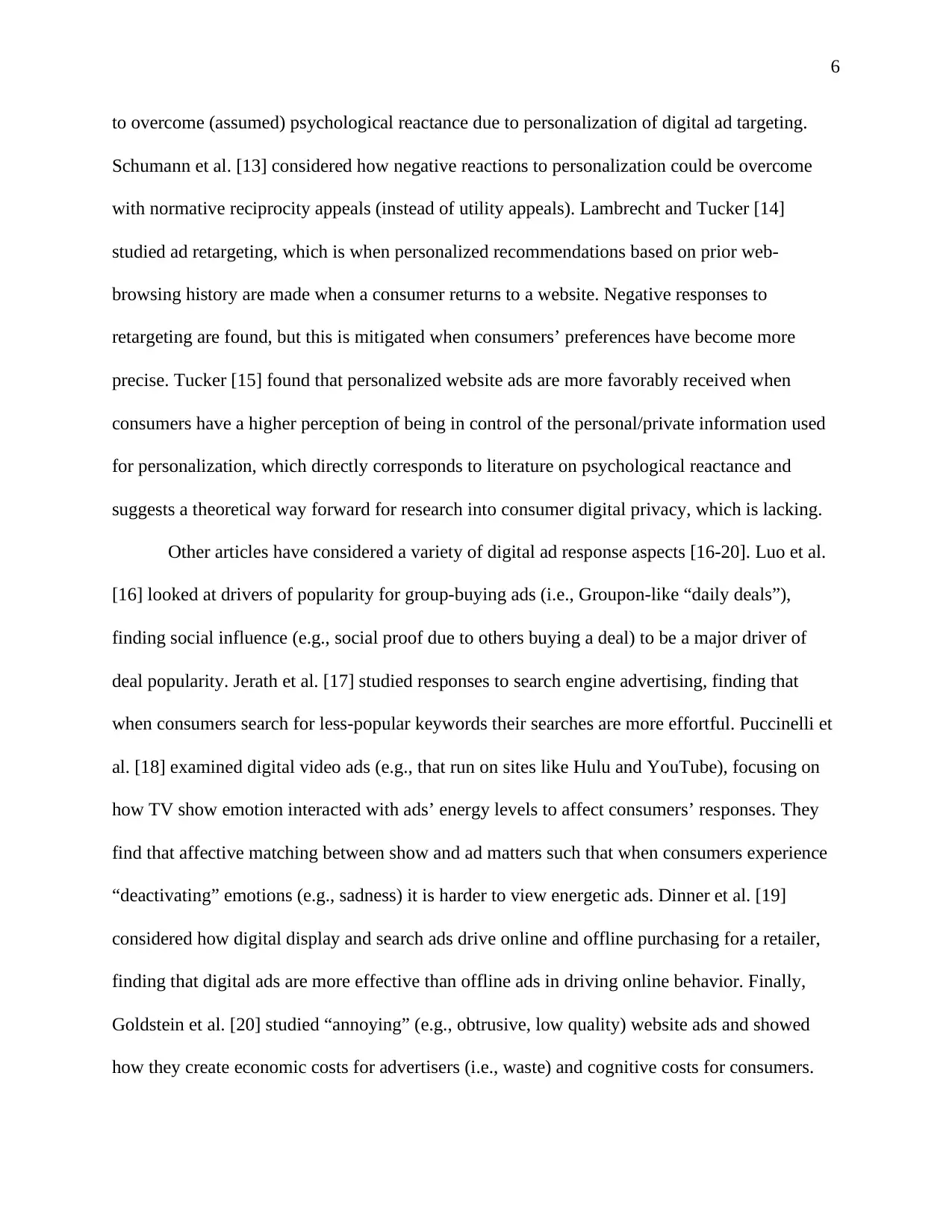
6
to overcome (assumed) psychological reactance due to personalization of digital ad targeting.
Schumann et al. [13] considered how negative reactions to personalization could be overcome
with normative reciprocity appeals (instead of utility appeals). Lambrecht and Tucker [14]
studied ad retargeting, which is when personalized recommendations based on prior web-
browsing history are made when a consumer returns to a website. Negative responses to
retargeting are found, but this is mitigated when consumers’ preferences have become more
precise. Tucker [15] found that personalized website ads are more favorably received when
consumers have a higher perception of being in control of the personal/private information used
for personalization, which directly corresponds to literature on psychological reactance and
suggests a theoretical way forward for research into consumer digital privacy, which is lacking.
Other articles have considered a variety of digital ad response aspects [16-20]. Luo et al.
[16] looked at drivers of popularity for group-buying ads (i.e., Groupon-like “daily deals”),
finding social influence (e.g., social proof due to others buying a deal) to be a major driver of
deal popularity. Jerath et al. [17] studied responses to search engine advertising, finding that
when consumers search for less-popular keywords their searches are more effortful. Puccinelli et
al. [18] examined digital video ads (e.g., that run on sites like Hulu and YouTube), focusing on
how TV show emotion interacted with ads’ energy levels to affect consumers’ responses. They
find that affective matching between show and ad matters such that when consumers experience
“deactivating” emotions (e.g., sadness) it is harder to view energetic ads. Dinner et al. [19]
considered how digital display and search ads drive online and offline purchasing for a retailer,
finding that digital ads are more effective than offline ads in driving online behavior. Finally,
Goldstein et al. [20] studied “annoying” (e.g., obtrusive, low quality) website ads and showed
how they create economic costs for advertisers (i.e., waste) and cognitive costs for consumers.
to overcome (assumed) psychological reactance due to personalization of digital ad targeting.
Schumann et al. [13] considered how negative reactions to personalization could be overcome
with normative reciprocity appeals (instead of utility appeals). Lambrecht and Tucker [14]
studied ad retargeting, which is when personalized recommendations based on prior web-
browsing history are made when a consumer returns to a website. Negative responses to
retargeting are found, but this is mitigated when consumers’ preferences have become more
precise. Tucker [15] found that personalized website ads are more favorably received when
consumers have a higher perception of being in control of the personal/private information used
for personalization, which directly corresponds to literature on psychological reactance and
suggests a theoretical way forward for research into consumer digital privacy, which is lacking.
Other articles have considered a variety of digital ad response aspects [16-20]. Luo et al.
[16] looked at drivers of popularity for group-buying ads (i.e., Groupon-like “daily deals”),
finding social influence (e.g., social proof due to others buying a deal) to be a major driver of
deal popularity. Jerath et al. [17] studied responses to search engine advertising, finding that
when consumers search for less-popular keywords their searches are more effortful. Puccinelli et
al. [18] examined digital video ads (e.g., that run on sites like Hulu and YouTube), focusing on
how TV show emotion interacted with ads’ energy levels to affect consumers’ responses. They
find that affective matching between show and ad matters such that when consumers experience
“deactivating” emotions (e.g., sadness) it is harder to view energetic ads. Dinner et al. [19]
considered how digital display and search ads drive online and offline purchasing for a retailer,
finding that digital ads are more effective than offline ads in driving online behavior. Finally,
Goldstein et al. [20] studied “annoying” (e.g., obtrusive, low quality) website ads and showed
how they create economic costs for advertisers (i.e., waste) and cognitive costs for consumers.
⊘ This is a preview!⊘
Do you want full access?
Subscribe today to unlock all pages.

Trusted by 1+ million students worldwide
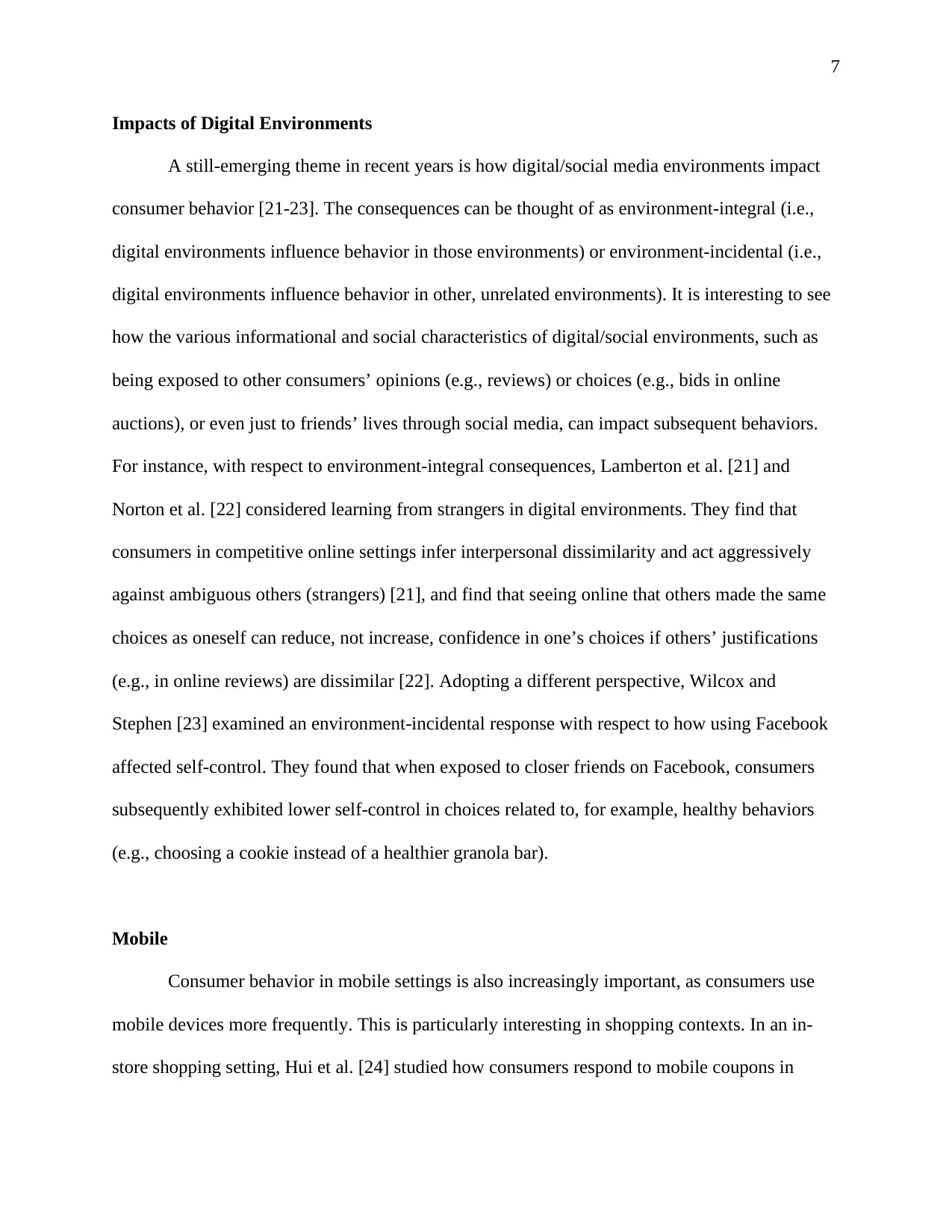
7
Impacts of Digital Environments
A still-emerging theme in recent years is how digital/social media environments impact
consumer behavior [21-23]. The consequences can be thought of as environment-integral (i.e.,
digital environments influence behavior in those environments) or environment-incidental (i.e.,
digital environments influence behavior in other, unrelated environments). It is interesting to see
how the various informational and social characteristics of digital/social environments, such as
being exposed to other consumers’ opinions (e.g., reviews) or choices (e.g., bids in online
auctions), or even just to friends’ lives through social media, can impact subsequent behaviors.
For instance, with respect to environment-integral consequences, Lamberton et al. [21] and
Norton et al. [22] considered learning from strangers in digital environments. They find that
consumers in competitive online settings infer interpersonal dissimilarity and act aggressively
against ambiguous others (strangers) [21], and find that seeing online that others made the same
choices as oneself can reduce, not increase, confidence in one’s choices if others’ justifications
(e.g., in online reviews) are dissimilar [22]. Adopting a different perspective, Wilcox and
Stephen [23] examined an environment-incidental response with respect to how using Facebook
affected self-control. They found that when exposed to closer friends on Facebook, consumers
subsequently exhibited lower self-control in choices related to, for example, healthy behaviors
(e.g., choosing a cookie instead of a healthier granola bar).
Mobile
Consumer behavior in mobile settings is also increasingly important, as consumers use
mobile devices more frequently. This is particularly interesting in shopping contexts. In an in-
store shopping setting, Hui et al. [24] studied how consumers respond to mobile coupons in
Impacts of Digital Environments
A still-emerging theme in recent years is how digital/social media environments impact
consumer behavior [21-23]. The consequences can be thought of as environment-integral (i.e.,
digital environments influence behavior in those environments) or environment-incidental (i.e.,
digital environments influence behavior in other, unrelated environments). It is interesting to see
how the various informational and social characteristics of digital/social environments, such as
being exposed to other consumers’ opinions (e.g., reviews) or choices (e.g., bids in online
auctions), or even just to friends’ lives through social media, can impact subsequent behaviors.
For instance, with respect to environment-integral consequences, Lamberton et al. [21] and
Norton et al. [22] considered learning from strangers in digital environments. They find that
consumers in competitive online settings infer interpersonal dissimilarity and act aggressively
against ambiguous others (strangers) [21], and find that seeing online that others made the same
choices as oneself can reduce, not increase, confidence in one’s choices if others’ justifications
(e.g., in online reviews) are dissimilar [22]. Adopting a different perspective, Wilcox and
Stephen [23] examined an environment-incidental response with respect to how using Facebook
affected self-control. They found that when exposed to closer friends on Facebook, consumers
subsequently exhibited lower self-control in choices related to, for example, healthy behaviors
(e.g., choosing a cookie instead of a healthier granola bar).
Mobile
Consumer behavior in mobile settings is also increasingly important, as consumers use
mobile devices more frequently. This is particularly interesting in shopping contexts. In an in-
store shopping setting, Hui et al. [24] studied how consumers respond to mobile coupons in
Paraphrase This Document
Need a fresh take? Get an instant paraphrase of this document with our AI Paraphraser
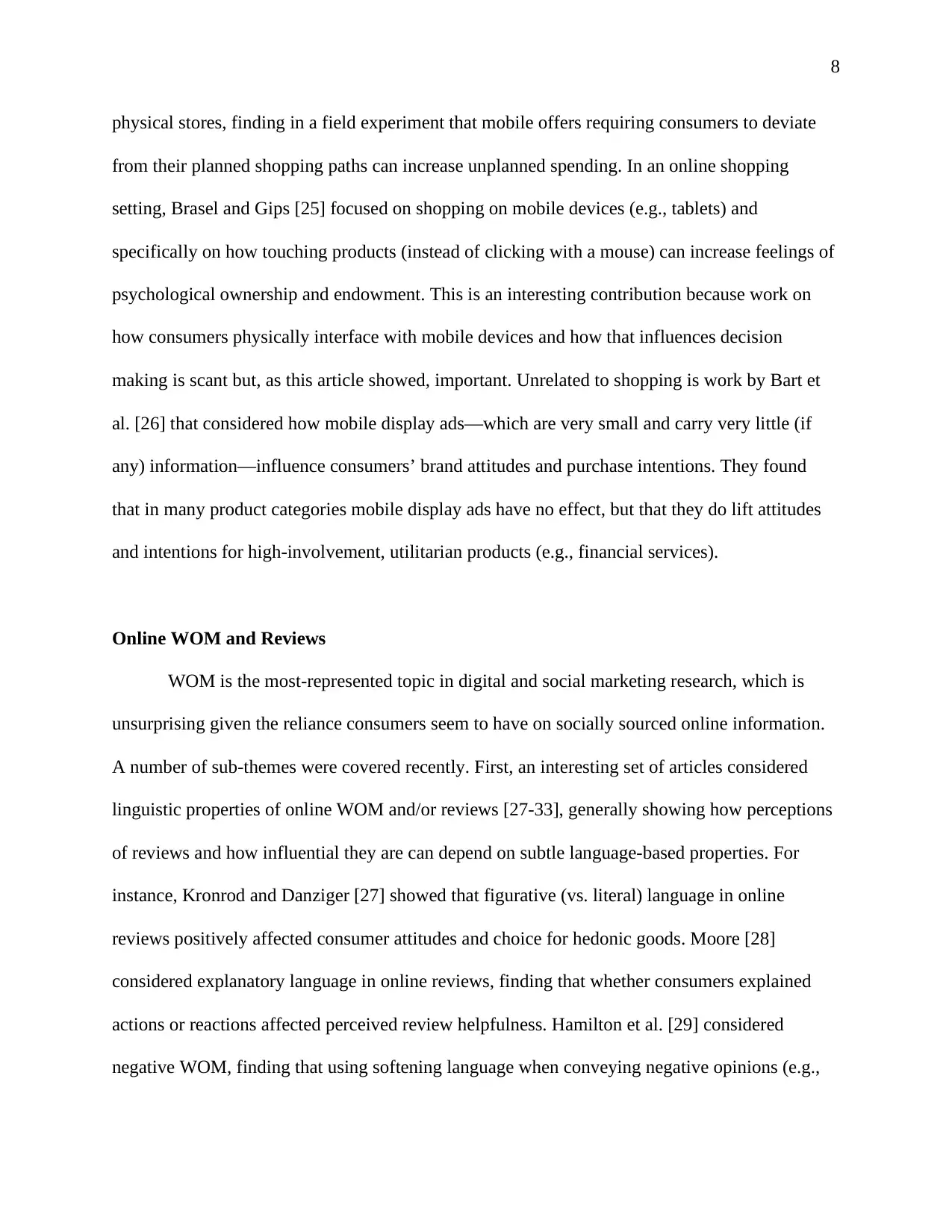
8
physical stores, finding in a field experiment that mobile offers requiring consumers to deviate
from their planned shopping paths can increase unplanned spending. In an online shopping
setting, Brasel and Gips [25] focused on shopping on mobile devices (e.g., tablets) and
specifically on how touching products (instead of clicking with a mouse) can increase feelings of
psychological ownership and endowment. This is an interesting contribution because work on
how consumers physically interface with mobile devices and how that influences decision
making is scant but, as this article showed, important. Unrelated to shopping is work by Bart et
al. [26] that considered how mobile display ads—which are very small and carry very little (if
any) information—influence consumers’ brand attitudes and purchase intentions. They found
that in many product categories mobile display ads have no effect, but that they do lift attitudes
and intentions for high-involvement, utilitarian products (e.g., financial services).
Online WOM and Reviews
WOM is the most-represented topic in digital and social marketing research, which is
unsurprising given the reliance consumers seem to have on socially sourced online information.
A number of sub-themes were covered recently. First, an interesting set of articles considered
linguistic properties of online WOM and/or reviews [27-33], generally showing how perceptions
of reviews and how influential they are can depend on subtle language-based properties. For
instance, Kronrod and Danziger [27] showed that figurative (vs. literal) language in online
reviews positively affected consumer attitudes and choice for hedonic goods. Moore [28]
considered explanatory language in online reviews, finding that whether consumers explained
actions or reactions affected perceived review helpfulness. Hamilton et al. [29] considered
negative WOM, finding that using softening language when conveying negative opinions (e.g.,
physical stores, finding in a field experiment that mobile offers requiring consumers to deviate
from their planned shopping paths can increase unplanned spending. In an online shopping
setting, Brasel and Gips [25] focused on shopping on mobile devices (e.g., tablets) and
specifically on how touching products (instead of clicking with a mouse) can increase feelings of
psychological ownership and endowment. This is an interesting contribution because work on
how consumers physically interface with mobile devices and how that influences decision
making is scant but, as this article showed, important. Unrelated to shopping is work by Bart et
al. [26] that considered how mobile display ads—which are very small and carry very little (if
any) information—influence consumers’ brand attitudes and purchase intentions. They found
that in many product categories mobile display ads have no effect, but that they do lift attitudes
and intentions for high-involvement, utilitarian products (e.g., financial services).
Online WOM and Reviews
WOM is the most-represented topic in digital and social marketing research, which is
unsurprising given the reliance consumers seem to have on socially sourced online information.
A number of sub-themes were covered recently. First, an interesting set of articles considered
linguistic properties of online WOM and/or reviews [27-33], generally showing how perceptions
of reviews and how influential they are can depend on subtle language-based properties. For
instance, Kronrod and Danziger [27] showed that figurative (vs. literal) language in online
reviews positively affected consumer attitudes and choice for hedonic goods. Moore [28]
considered explanatory language in online reviews, finding that whether consumers explained
actions or reactions affected perceived review helpfulness. Hamilton et al. [29] considered
negative WOM, finding that using softening language when conveying negative opinions (e.g.,
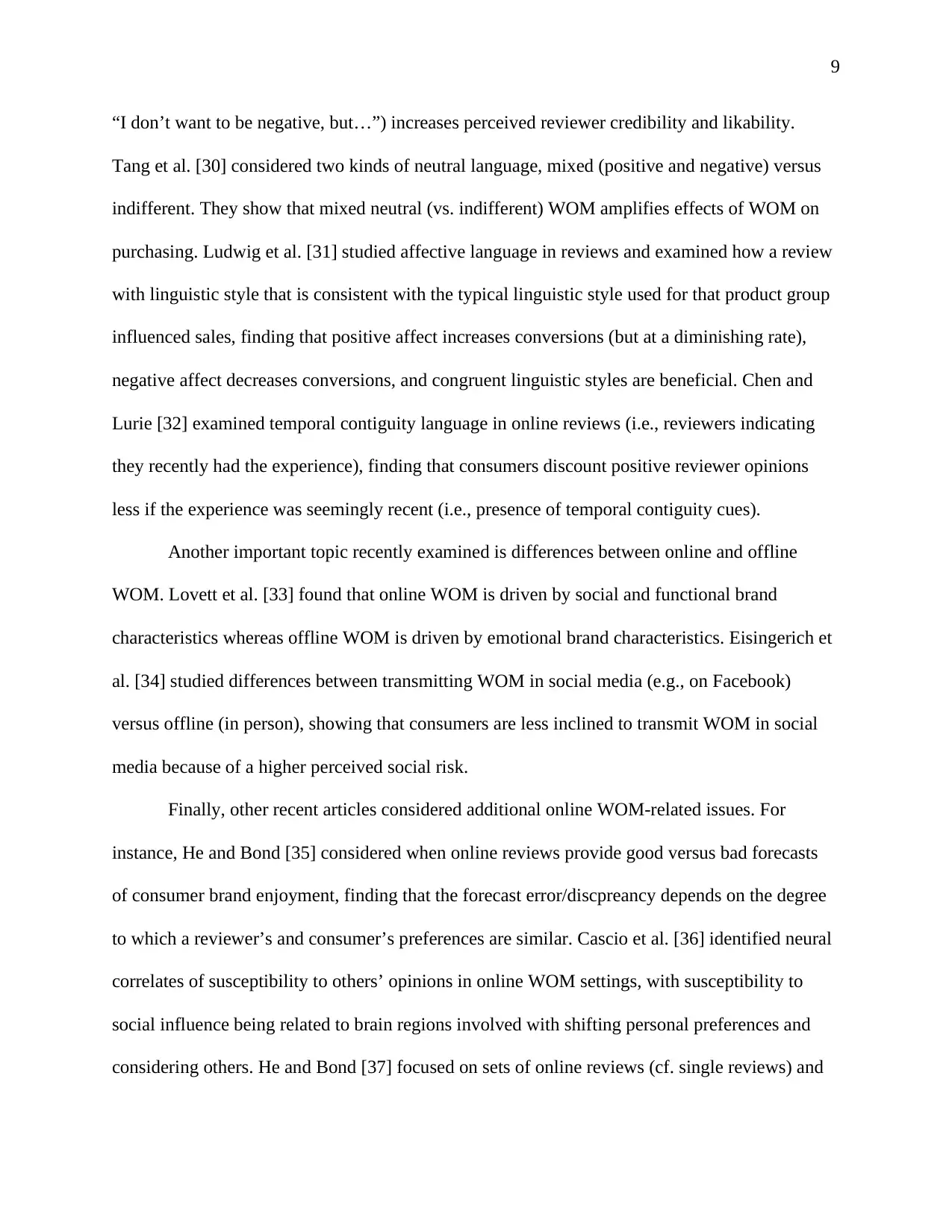
9
“I don’t want to be negative, but…”) increases perceived reviewer credibility and likability.
Tang et al. [30] considered two kinds of neutral language, mixed (positive and negative) versus
indifferent. They show that mixed neutral (vs. indifferent) WOM amplifies effects of WOM on
purchasing. Ludwig et al. [31] studied affective language in reviews and examined how a review
with linguistic style that is consistent with the typical linguistic style used for that product group
influenced sales, finding that positive affect increases conversions (but at a diminishing rate),
negative affect decreases conversions, and congruent linguistic styles are beneficial. Chen and
Lurie [32] examined temporal contiguity language in online reviews (i.e., reviewers indicating
they recently had the experience), finding that consumers discount positive reviewer opinions
less if the experience was seemingly recent (i.e., presence of temporal contiguity cues).
Another important topic recently examined is differences between online and offline
WOM. Lovett et al. [33] found that online WOM is driven by social and functional brand
characteristics whereas offline WOM is driven by emotional brand characteristics. Eisingerich et
al. [34] studied differences between transmitting WOM in social media (e.g., on Facebook)
versus offline (in person), showing that consumers are less inclined to transmit WOM in social
media because of a higher perceived social risk.
Finally, other recent articles considered additional online WOM-related issues. For
instance, He and Bond [35] considered when online reviews provide good versus bad forecasts
of consumer brand enjoyment, finding that the forecast error/discpreancy depends on the degree
to which a reviewer’s and consumer’s preferences are similar. Cascio et al. [36] identified neural
correlates of susceptibility to others’ opinions in online WOM settings, with susceptibility to
social influence being related to brain regions involved with shifting personal preferences and
considering others. He and Bond [37] focused on sets of online reviews (cf. single reviews) and
“I don’t want to be negative, but…”) increases perceived reviewer credibility and likability.
Tang et al. [30] considered two kinds of neutral language, mixed (positive and negative) versus
indifferent. They show that mixed neutral (vs. indifferent) WOM amplifies effects of WOM on
purchasing. Ludwig et al. [31] studied affective language in reviews and examined how a review
with linguistic style that is consistent with the typical linguistic style used for that product group
influenced sales, finding that positive affect increases conversions (but at a diminishing rate),
negative affect decreases conversions, and congruent linguistic styles are beneficial. Chen and
Lurie [32] examined temporal contiguity language in online reviews (i.e., reviewers indicating
they recently had the experience), finding that consumers discount positive reviewer opinions
less if the experience was seemingly recent (i.e., presence of temporal contiguity cues).
Another important topic recently examined is differences between online and offline
WOM. Lovett et al. [33] found that online WOM is driven by social and functional brand
characteristics whereas offline WOM is driven by emotional brand characteristics. Eisingerich et
al. [34] studied differences between transmitting WOM in social media (e.g., on Facebook)
versus offline (in person), showing that consumers are less inclined to transmit WOM in social
media because of a higher perceived social risk.
Finally, other recent articles considered additional online WOM-related issues. For
instance, He and Bond [35] considered when online reviews provide good versus bad forecasts
of consumer brand enjoyment, finding that the forecast error/discpreancy depends on the degree
to which a reviewer’s and consumer’s preferences are similar. Cascio et al. [36] identified neural
correlates of susceptibility to others’ opinions in online WOM settings, with susceptibility to
social influence being related to brain regions involved with shifting personal preferences and
considering others. He and Bond [37] focused on sets of online reviews (cf. single reviews) and
⊘ This is a preview!⊘
Do you want full access?
Subscribe today to unlock all pages.

Trusted by 1+ million students worldwide
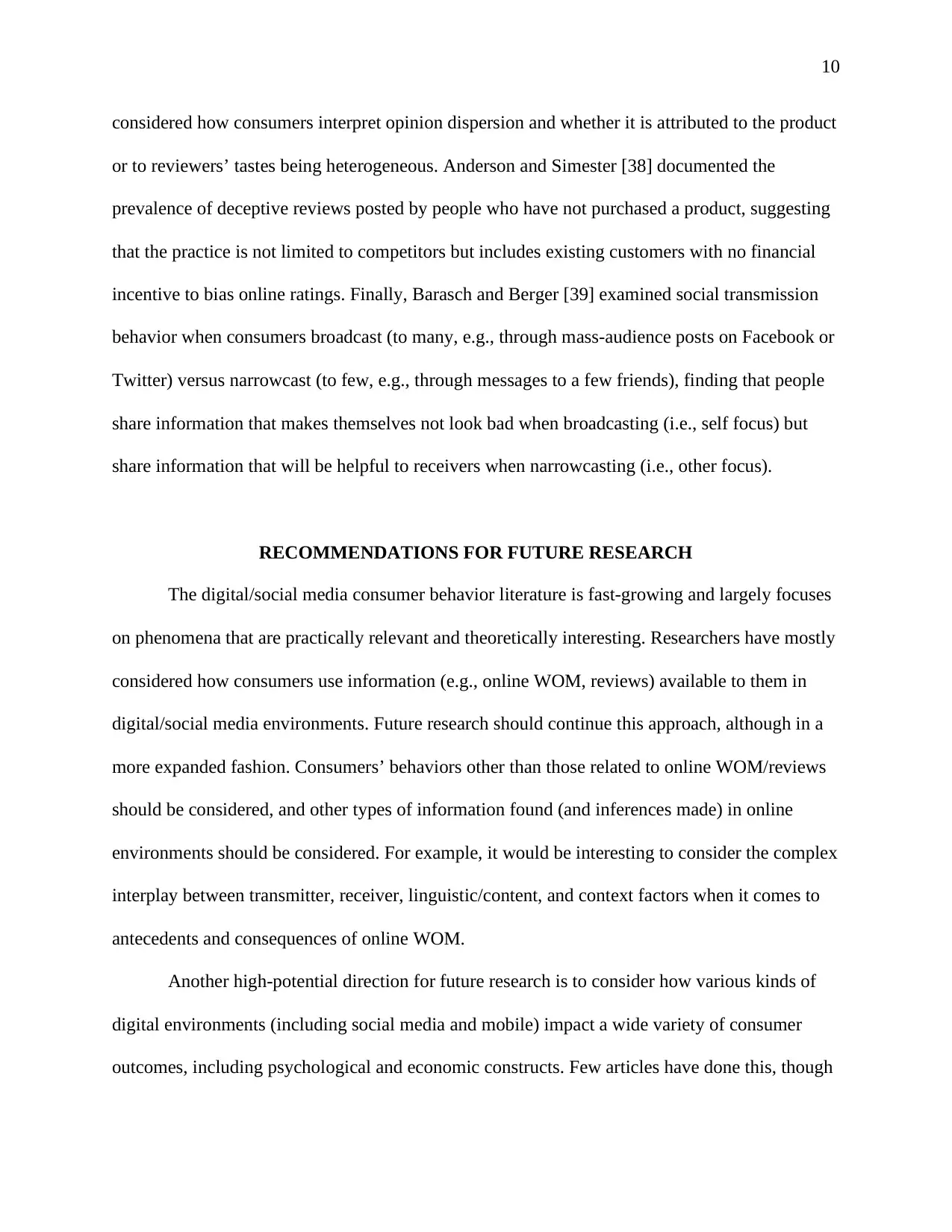
10
considered how consumers interpret opinion dispersion and whether it is attributed to the product
or to reviewers’ tastes being heterogeneous. Anderson and Simester [38] documented the
prevalence of deceptive reviews posted by people who have not purchased a product, suggesting
that the practice is not limited to competitors but includes existing customers with no financial
incentive to bias online ratings. Finally, Barasch and Berger [39] examined social transmission
behavior when consumers broadcast (to many, e.g., through mass-audience posts on Facebook or
Twitter) versus narrowcast (to few, e.g., through messages to a few friends), finding that people
share information that makes themselves not look bad when broadcasting (i.e., self focus) but
share information that will be helpful to receivers when narrowcasting (i.e., other focus).
RECOMMENDATIONS FOR FUTURE RESEARCH
The digital/social media consumer behavior literature is fast-growing and largely focuses
on phenomena that are practically relevant and theoretically interesting. Researchers have mostly
considered how consumers use information (e.g., online WOM, reviews) available to them in
digital/social media environments. Future research should continue this approach, although in a
more expanded fashion. Consumers’ behaviors other than those related to online WOM/reviews
should be considered, and other types of information found (and inferences made) in online
environments should be considered. For example, it would be interesting to consider the complex
interplay between transmitter, receiver, linguistic/content, and context factors when it comes to
antecedents and consequences of online WOM.
Another high-potential direction for future research is to consider how various kinds of
digital environments (including social media and mobile) impact a wide variety of consumer
outcomes, including psychological and economic constructs. Few articles have done this, though
considered how consumers interpret opinion dispersion and whether it is attributed to the product
or to reviewers’ tastes being heterogeneous. Anderson and Simester [38] documented the
prevalence of deceptive reviews posted by people who have not purchased a product, suggesting
that the practice is not limited to competitors but includes existing customers with no financial
incentive to bias online ratings. Finally, Barasch and Berger [39] examined social transmission
behavior when consumers broadcast (to many, e.g., through mass-audience posts on Facebook or
Twitter) versus narrowcast (to few, e.g., through messages to a few friends), finding that people
share information that makes themselves not look bad when broadcasting (i.e., self focus) but
share information that will be helpful to receivers when narrowcasting (i.e., other focus).
RECOMMENDATIONS FOR FUTURE RESEARCH
The digital/social media consumer behavior literature is fast-growing and largely focuses
on phenomena that are practically relevant and theoretically interesting. Researchers have mostly
considered how consumers use information (e.g., online WOM, reviews) available to them in
digital/social media environments. Future research should continue this approach, although in a
more expanded fashion. Consumers’ behaviors other than those related to online WOM/reviews
should be considered, and other types of information found (and inferences made) in online
environments should be considered. For example, it would be interesting to consider the complex
interplay between transmitter, receiver, linguistic/content, and context factors when it comes to
antecedents and consequences of online WOM.
Another high-potential direction for future research is to consider how various kinds of
digital environments (including social media and mobile) impact a wide variety of consumer
outcomes, including psychological and economic constructs. Few articles have done this, though
Paraphrase This Document
Need a fresh take? Get an instant paraphrase of this document with our AI Paraphraser
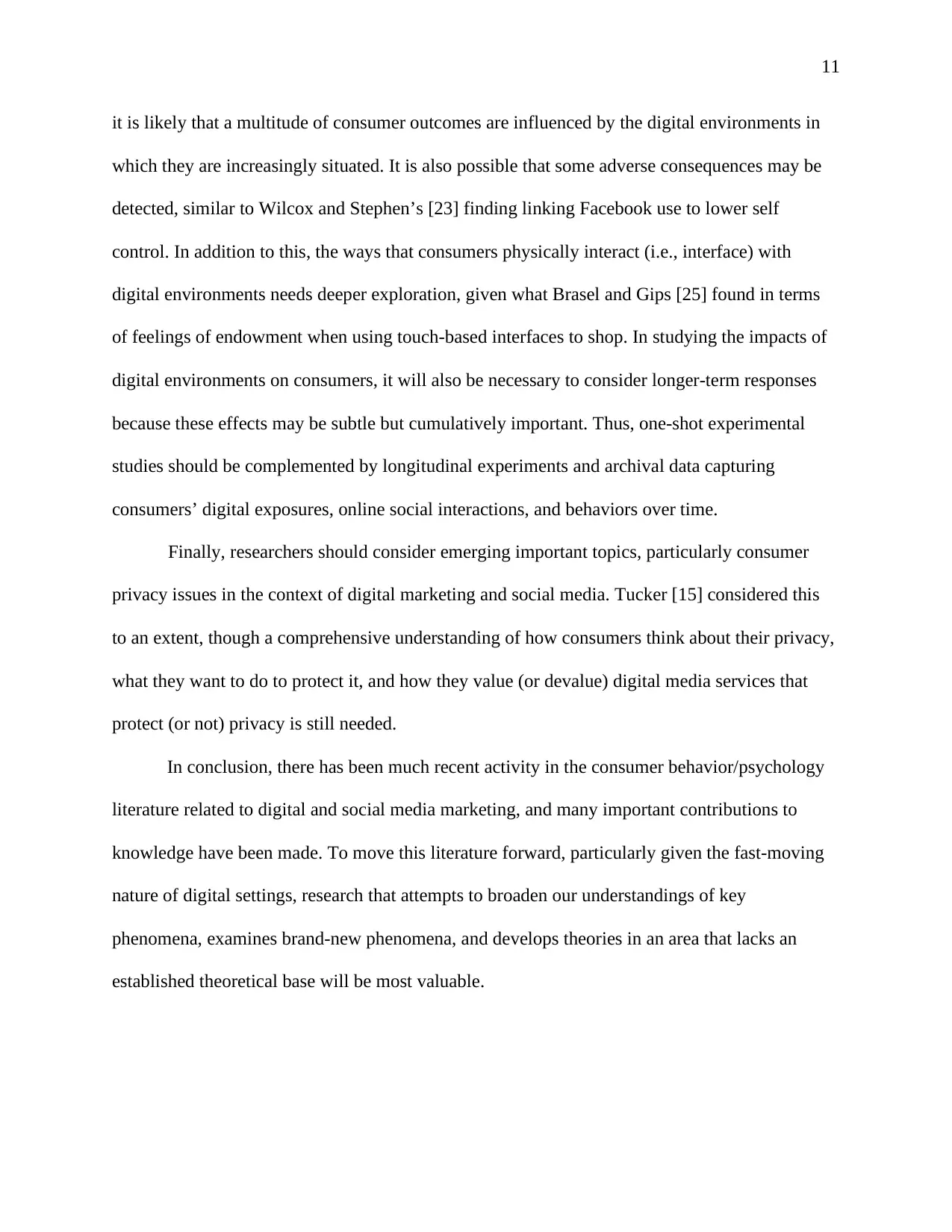
11
it is likely that a multitude of consumer outcomes are influenced by the digital environments in
which they are increasingly situated. It is also possible that some adverse consequences may be
detected, similar to Wilcox and Stephen’s [23] finding linking Facebook use to lower self
control. In addition to this, the ways that consumers physically interact (i.e., interface) with
digital environments needs deeper exploration, given what Brasel and Gips [25] found in terms
of feelings of endowment when using touch-based interfaces to shop. In studying the impacts of
digital environments on consumers, it will also be necessary to consider longer-term responses
because these effects may be subtle but cumulatively important. Thus, one-shot experimental
studies should be complemented by longitudinal experiments and archival data capturing
consumers’ digital exposures, online social interactions, and behaviors over time.
Finally, researchers should consider emerging important topics, particularly consumer
privacy issues in the context of digital marketing and social media. Tucker [15] considered this
to an extent, though a comprehensive understanding of how consumers think about their privacy,
what they want to do to protect it, and how they value (or devalue) digital media services that
protect (or not) privacy is still needed.
In conclusion, there has been much recent activity in the consumer behavior/psychology
literature related to digital and social media marketing, and many important contributions to
knowledge have been made. To move this literature forward, particularly given the fast-moving
nature of digital settings, research that attempts to broaden our understandings of key
phenomena, examines brand-new phenomena, and develops theories in an area that lacks an
established theoretical base will be most valuable.
it is likely that a multitude of consumer outcomes are influenced by the digital environments in
which they are increasingly situated. It is also possible that some adverse consequences may be
detected, similar to Wilcox and Stephen’s [23] finding linking Facebook use to lower self
control. In addition to this, the ways that consumers physically interact (i.e., interface) with
digital environments needs deeper exploration, given what Brasel and Gips [25] found in terms
of feelings of endowment when using touch-based interfaces to shop. In studying the impacts of
digital environments on consumers, it will also be necessary to consider longer-term responses
because these effects may be subtle but cumulatively important. Thus, one-shot experimental
studies should be complemented by longitudinal experiments and archival data capturing
consumers’ digital exposures, online social interactions, and behaviors over time.
Finally, researchers should consider emerging important topics, particularly consumer
privacy issues in the context of digital marketing and social media. Tucker [15] considered this
to an extent, though a comprehensive understanding of how consumers think about their privacy,
what they want to do to protect it, and how they value (or devalue) digital media services that
protect (or not) privacy is still needed.
In conclusion, there has been much recent activity in the consumer behavior/psychology
literature related to digital and social media marketing, and many important contributions to
knowledge have been made. To move this literature forward, particularly given the fast-moving
nature of digital settings, research that attempts to broaden our understandings of key
phenomena, examines brand-new phenomena, and develops theories in an area that lacks an
established theoretical base will be most valuable.
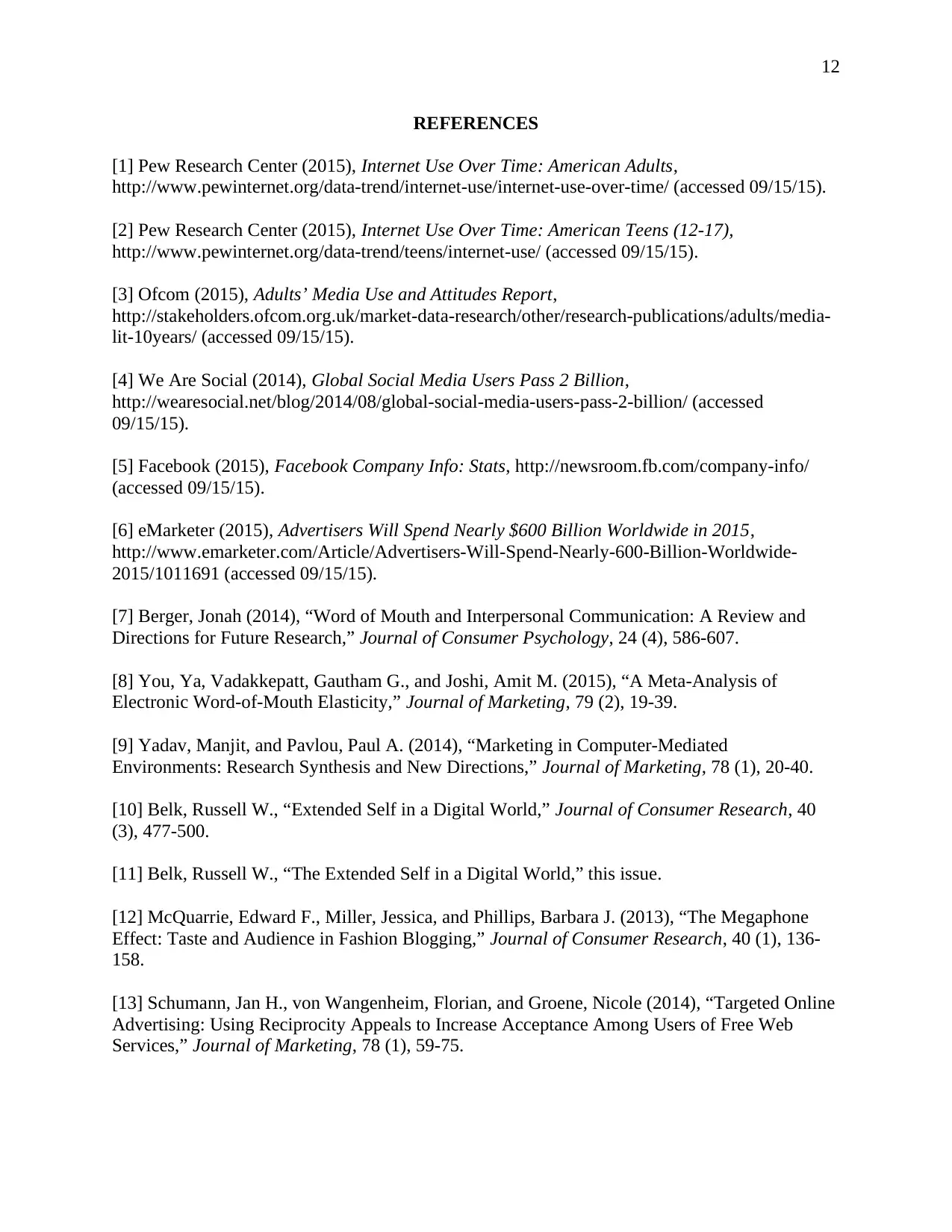
12
REFERENCES
[1] Pew Research Center (2015), Internet Use Over Time: American Adults,
http://www.pewinternet.org/data-trend/internet-use/internet-use-over-time/ (accessed 09/15/15).
[2] Pew Research Center (2015), Internet Use Over Time: American Teens (12-17),
http://www.pewinternet.org/data-trend/teens/internet-use/ (accessed 09/15/15).
[3] Ofcom (2015), Adults’ Media Use and Attitudes Report,
http://stakeholders.ofcom.org.uk/market-data-research/other/research-publications/adults/media-
lit-10years/ (accessed 09/15/15).
[4] We Are Social (2014), Global Social Media Users Pass 2 Billion,
http://wearesocial.net/blog/2014/08/global-social-media-users-pass-2-billion/ (accessed
09/15/15).
[5] Facebook (2015), Facebook Company Info: Stats, http://newsroom.fb.com/company-info/
(accessed 09/15/15).
[6] eMarketer (2015), Advertisers Will Spend Nearly $600 Billion Worldwide in 2015,
http://www.emarketer.com/Article/Advertisers-Will-Spend-Nearly-600-Billion-Worldwide-
2015/1011691 (accessed 09/15/15).
[7] Berger, Jonah (2014), “Word of Mouth and Interpersonal Communication: A Review and
Directions for Future Research,” Journal of Consumer Psychology, 24 (4), 586-607.
[8] You, Ya, Vadakkepatt, Gautham G., and Joshi, Amit M. (2015), “A Meta-Analysis of
Electronic Word-of-Mouth Elasticity,” Journal of Marketing, 79 (2), 19-39.
[9] Yadav, Manjit, and Pavlou, Paul A. (2014), “Marketing in Computer-Mediated
Environments: Research Synthesis and New Directions,” Journal of Marketing, 78 (1), 20-40.
[10] Belk, Russell W., “Extended Self in a Digital World,” Journal of Consumer Research, 40
(3), 477-500.
[11] Belk, Russell W., “The Extended Self in a Digital World,” this issue.
[12] McQuarrie, Edward F., Miller, Jessica, and Phillips, Barbara J. (2013), “The Megaphone
Effect: Taste and Audience in Fashion Blogging,” Journal of Consumer Research, 40 (1), 136-
158.
[13] Schumann, Jan H., von Wangenheim, Florian, and Groene, Nicole (2014), “Targeted Online
Advertising: Using Reciprocity Appeals to Increase Acceptance Among Users of Free Web
Services,” Journal of Marketing, 78 (1), 59-75.
REFERENCES
[1] Pew Research Center (2015), Internet Use Over Time: American Adults,
http://www.pewinternet.org/data-trend/internet-use/internet-use-over-time/ (accessed 09/15/15).
[2] Pew Research Center (2015), Internet Use Over Time: American Teens (12-17),
http://www.pewinternet.org/data-trend/teens/internet-use/ (accessed 09/15/15).
[3] Ofcom (2015), Adults’ Media Use and Attitudes Report,
http://stakeholders.ofcom.org.uk/market-data-research/other/research-publications/adults/media-
lit-10years/ (accessed 09/15/15).
[4] We Are Social (2014), Global Social Media Users Pass 2 Billion,
http://wearesocial.net/blog/2014/08/global-social-media-users-pass-2-billion/ (accessed
09/15/15).
[5] Facebook (2015), Facebook Company Info: Stats, http://newsroom.fb.com/company-info/
(accessed 09/15/15).
[6] eMarketer (2015), Advertisers Will Spend Nearly $600 Billion Worldwide in 2015,
http://www.emarketer.com/Article/Advertisers-Will-Spend-Nearly-600-Billion-Worldwide-
2015/1011691 (accessed 09/15/15).
[7] Berger, Jonah (2014), “Word of Mouth and Interpersonal Communication: A Review and
Directions for Future Research,” Journal of Consumer Psychology, 24 (4), 586-607.
[8] You, Ya, Vadakkepatt, Gautham G., and Joshi, Amit M. (2015), “A Meta-Analysis of
Electronic Word-of-Mouth Elasticity,” Journal of Marketing, 79 (2), 19-39.
[9] Yadav, Manjit, and Pavlou, Paul A. (2014), “Marketing in Computer-Mediated
Environments: Research Synthesis and New Directions,” Journal of Marketing, 78 (1), 20-40.
[10] Belk, Russell W., “Extended Self in a Digital World,” Journal of Consumer Research, 40
(3), 477-500.
[11] Belk, Russell W., “The Extended Self in a Digital World,” this issue.
[12] McQuarrie, Edward F., Miller, Jessica, and Phillips, Barbara J. (2013), “The Megaphone
Effect: Taste and Audience in Fashion Blogging,” Journal of Consumer Research, 40 (1), 136-
158.
[13] Schumann, Jan H., von Wangenheim, Florian, and Groene, Nicole (2014), “Targeted Online
Advertising: Using Reciprocity Appeals to Increase Acceptance Among Users of Free Web
Services,” Journal of Marketing, 78 (1), 59-75.
⊘ This is a preview!⊘
Do you want full access?
Subscribe today to unlock all pages.

Trusted by 1+ million students worldwide
1 out of 16
Related Documents
Your All-in-One AI-Powered Toolkit for Academic Success.
+13062052269
info@desklib.com
Available 24*7 on WhatsApp / Email
![[object Object]](/_next/static/media/star-bottom.7253800d.svg)
Unlock your academic potential
Copyright © 2020–2026 A2Z Services. All Rights Reserved. Developed and managed by ZUCOL.





